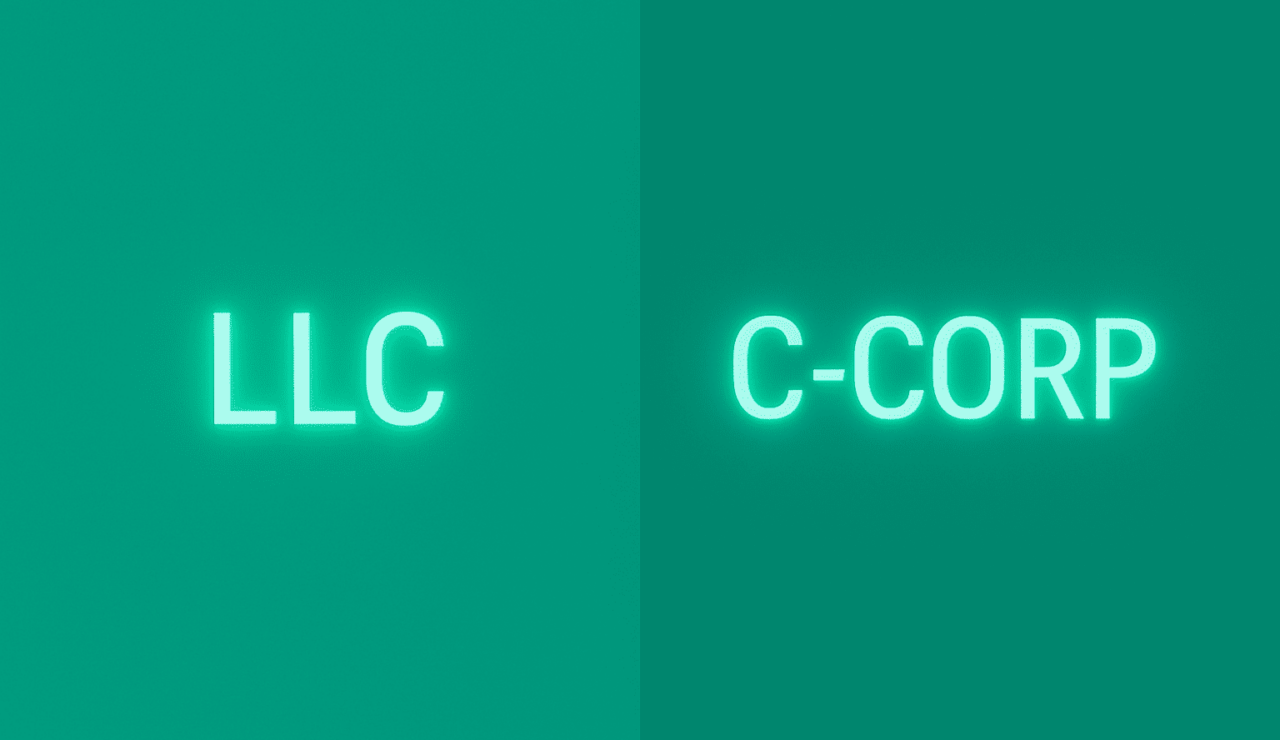
Ready to expand to the U.S.?
Book a call with me and my team! We support European startups with a smooth and compliant U.S. market entry – from setting up your Delaware C-Corp to reviewing your commercial contracts. With our legal expertise and hands-on experience as founders and in-house counsel, we’ll help you avoid common pitfalls and scale with confidence.
Armin Kaiser, Head of U.S. Expansion Expert & Managing Associate @LEXR
When expanding your startup to the U.S., choosing the right legal entity sets the foundation for your success. European companies typically choose between two main options: the C-Corporation (C-Corp) and the Limited Liability Company (LLC).
Choosing a legal structure affects how your U.S. business operates and grows. It determines:
- Liability Protection: How much risk the parent company takes on.
- Tax Treatment: How income is taxed in the U.S. and potentially in Europe.
- Investment Readiness: How attractive the company is to U.S. investors.
- Operational Flexibility: How decisions are made and how profits are distributed.
This guide breaks down the essential advantages and disadvantages of the two principal corporate forms, and will help you decide which is the best fit for your business.
1. C-Corporation (C-Corp)
The C-Corp is the most common structure for startups aiming to scale and attract investors.
Best for: High-growth startups seeking to raise capital through financing rounds and scale operations.
Advantages:
- Limited liability protection: Shareholders are typically not personally liable for the corporation’s debts or legal obligations. Liability is generally limited to the amount invested in the company. However, exceptions exist, such as in cases of piercing the corporate veil, where shareholders could be held personally liable if the corporation is misused for fraudulent or improper purposes.
- Investor Friendly: C-Corps are highly preferred by venture capitalists, accelerators, and institutional investors due to their clear corporate governance, scalability, and familiarity within the U.S. investment landscape.
- Flexible Structure: C-Corps allow for the creation of multiple classes of stock (such as common and preferred shares), making it easier to structure complex investment deals. They also facilitate the issuance of stock options and other equity incentives, which are essential for attracting and retaining top talent. There are also no restrictions on the number of shareholders or their residency, which supports growth and broad ownership.
Disadvantages:
- Double Taxation: One significant drawback is double taxation. First, the corporation pays U.S. federal and state corporate income taxes on its profits. Then, when the company distributes dividends to shareholders, those dividends are taxed again on the shareholders’ personal tax returns. Shareholder-level taxation is typically triggered when dividends are issued or when shareholders sell their shares for a gain. For foreign parent companies, this often involves a withholding tax on dividend payments made to overseas shareholders. The standard U.S. withholding tax rate on dividends is 30%, though this may be reduced under applicable tax treaties. Without proper tax planning, this can significantly impact the overall return on investment for international shareholders.
- Regulatory Formalities: C-Corps must comply with more stringent corporate governance requirements compared to LLCs. This includes:
- Filing annual reports and paying franchise taxes.
- Holding annual shareholder and board of directors meetings and documenting decisions through meeting minutes.
- Maintaining detailed corporate records and a stock ledger.
Filing with the Securities and Exchange Commission (SEC) if the company becomes publicly traded.
Discover our U.S. Expansion Services
Planning to expand your startup to the U.S.? Our U.S. Expansion service helps you navigate the legal setup — from incorporating your Delaware C-Corp to reviewing commercial contracts. Visit our landing page to learn more about how we support European startups entering the U.S. market.
2. Limited Liability Company (LLC)
An LLC combines the liability protection of a corporation with the flexibility and pass-through taxation of a partnership.
Best for: Privately held companies and bootstrapped early-stage startups, seeking operational flexibility without immediate plans to raise venture capital.
Advantages:
- Limited Liability: Like a C-Corp, an LLC protects the parent company from U.S. liabilities, limiting exposure to the amount invested in the LLC. This shields the parent company from direct legal or financial responsibility for the LLC’s operations.
- Tax Flexibility: By default, a single-member LLC is treated as a disregarded entity, meaning its income and losses “pass through” to the parent company and are reported on the parent’s tax return. Multi-member LLCs are taxed as partnerships unless they elect to be treated as a corporation. This pass-through taxation avoids the double taxation faced by corporations.
- Entity Classification Election: LLCs can elect to be taxed as a corporation by filing IRS Form 8832, allowing the LLC to be taxed like a C-Corporation, which may be beneficial for limiting U.S. tax exposure and managing profits.
- Operational Flexibility: LLCs offer fewer formalities and less rigid corporate governance requirements compared to corporations. They allow for custom management structures and flexible distribution of profits, unlike corporations which must follow a more rigid share-based profit distribution.
Disadvantages:
- Investor Reluctance: Venture capitalists and institutional investors generally prefer corporations, especially Delaware C-Corps, due to their familiar governance structure, ease of issuing stock, and clarity on equity compensation. LLCs’ pass-through taxation and flexible structure make them less suitable for managing complex equity ownership and investor rights.
- Pass-Through Tax Risks: Pass-through taxation can create unexpected tax obligations for the foreign parent company. If not carefully structured, the IRS may impute global (non-U.S.) income to the U.S. entity, subjecting the foreign parent to U.S. taxation. This structure could also expose the parent company to IRS audits.
- State-Specific Rules: LLC regulations and fees vary by state, potentially creating inconsistent compliance requirements across jurisdictions.
Compared to a branch office, the subsidiary provides significant advantages:
- Easier Banking: Subsidiaries can more easily open U.S. bank accounts, streamlining financial operations.
- Simplified Hiring: A subsidiary can directly hire U.S.-based employees without additional registration hurdles.
- Customer Trust: Depending on the industry, U.S. market players may prefer to contract and do business with U.S. entities.
- Liability Shield: The parent company is protected from the subsidiary’s legal and financial obligations, reducing exposure to U.S. business risks, which can be very costly.
By forming a subsidiary, companies can independently manage U.S. operations while protecting the parent company from legal and financial risks.
3. S-Corporation (S-Corp)
An S-Corp offers pass-through taxation but is typically not available to foreign companies.
Advantages:
- Pass-Through Taxation: Income is taxed at the shareholder level only.
Disadvantages:
- Ownership Restrictions: Limited to 100 shareholders who must be U.S. citizens or permanent residents. This makes S-Corps generally unavailable to European companies or foreign investors without a U.S. nexus.
- Limited Flexibility: Only one class of stock allowed.
Best for: U.S.-based small businesses; generally not an option for foreign entities.
Next Steps: Setting Up Your U.S. Entity
Choosing the right legal structure is foundational for a successful U.S. expansion. At LEXR, we specialize in helping European startups navigate entity selection, formation, and compliance.
Ready to launch your U.S. expansion the right way? Contact our U.S. expansion team for tailored guidance aligned with your goals.













